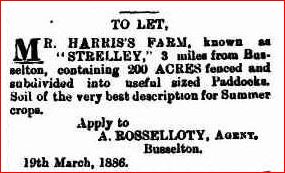cont .. Part 3 The Harris family of Derbyshire – pioneers of the Swan Valley, Western Australia from 1833.
Joseph Strelley Harris was baptized on 26th November 1812 at St Peters, Leeds. The oldest of Joseph and Lucy’s 6 children he made a real mark on the new colony. He like others received a Government grant of Land Town allotment W37 August 1834. Reportedly Mount Harris was named after the early pioneer settler as were Harris and Strelly Streets and the suburb of Strelley Grange in Busselton.
The colony got a very poor assessment when in 1836 Lieutenant Henry Bunbury explored the Williams River. He declared that he “had passed through a wretched country with neither water nor feed: on the Williams the land is generally very bad and the water brackish.”
Advertisement in The Perth Gazette and Western Australian Journal, Saturday 27 February 1836
Potential settlers such as Joseph did not seem to be put off. Bunbury’s negative assessment seemed to make no impression on potential settlers. Joseph Strelley Harris was the district’s first settler when he drove 300 sheep and some cattle from York to his father¹s property at Williams in 1836. In 1839 Harris was the first to drive sheep overland from King George III Sound to Williams. One problem, that of poisonous plants (at least three were identified) proved to be problematic to early pastoralists.
While driving sheep from Swan to Avon he suffered heavy stock losses from these poison plants and was instrumental in identifying the relationship between the sheep deaths and the poisonous plants which were present. He drove the sheep along old Nyoongar (Aboriginal people) track through the jarrah and marri forests making observations and friends along the way.
As an early pioneer he devoted his life to the Public Service and Administration of the colony. He also regularly carried the mail between King George Sound and Perth in the 1830s and probably spent much time in the company of Nyoongar people. Although there are no records that he ever married, Aboriginal “marriages” were encouraged in the new colony as a way of increasing birth rates and subsequently population and labour. One reference alludes to the fact that an Aboriginal elder named Norman Harris is amongst Joseph’s descendants who form part of the present Nyoongar aboriginal community in Perth.
He was Acting Resident Magistrate at Williams in 1840 and Magistrate at Toodyay 1850-1860 and then in the second Resident Magistrate for Sussex and Vasse from 1861 to 1880. He retired on a well earned pension in 1880. The Western Australia Courts website describes him as “an energetic character”. Apparently he clashed with the Goaler and Chairman and other Towns Trust members over the Queens Street construction. He left his mark with a spectacular avenue of peppermint trees after organizing a “busy bee” at the newly constructed street. His suggestion of surveying a main road with two bridges from The Vasse to Blechyndon Farm at Bridgetown served to greatly increase travel and therefore communication in the district.
During his frontier travels he was able to make observations about the Australian bush which was prone to behave differently to forests at home in England especially with regards fire fighting, the interaction of wildlife and regeneration of weeds. He held another responsible post as Inspector of Timber Forests for Western Australia.
Joseph Jnr also named his farm “Strelley”
In July 1888 in the Western Mail it was reported that he was returning from Vasse to live on the Swan. The newspaper correspondent gave this opinion of him. “Mr Harris has been residing amongst us for a considerable number of years and if his abilities were not exactly high order we ought to blame (more than himself), the Government which placed him in the position for which he never was and never would have been fitted”. Joseph existed in a colony where manpower and enterprise was thin on the ground. He wore many hats as necessary in those early days of settlement. However the correspondent went on to say “His genial hospitality will, however always be gratefully remembered by a very large number of our settlers.”
His death notice in his 78th year was published in The Western Australian on 11th December 1889 and records him dying in Perth. Despite his opportunities to make a fortune in the new colony he didn’t die a rich man. After probate, £300 was left by Joseph Harris Strelley- a Western Australian Gentleman- to his brother William.
Joseph Strelley Harris Photos compliments of Kevin Anderson




No comments:
Post a Comment